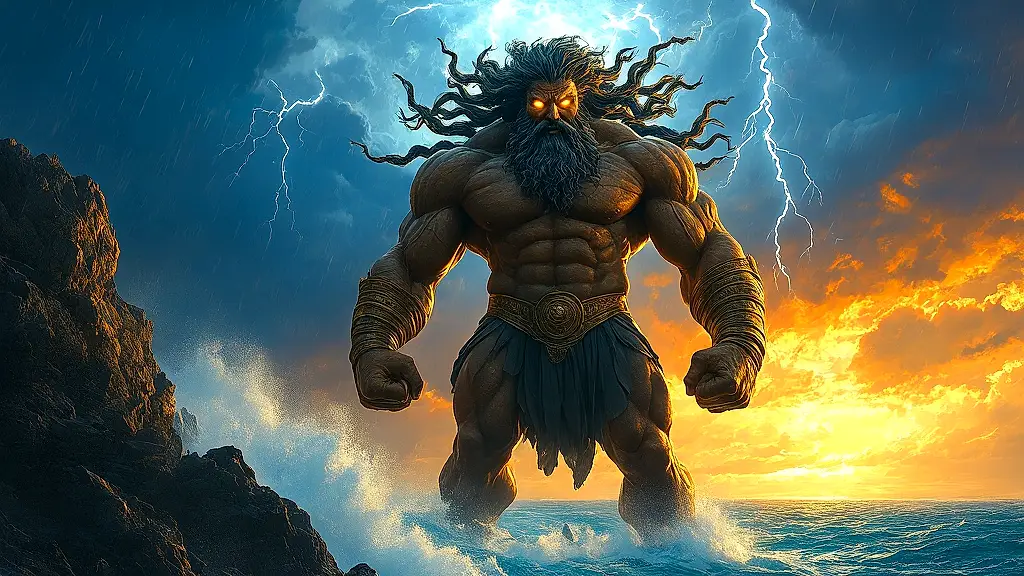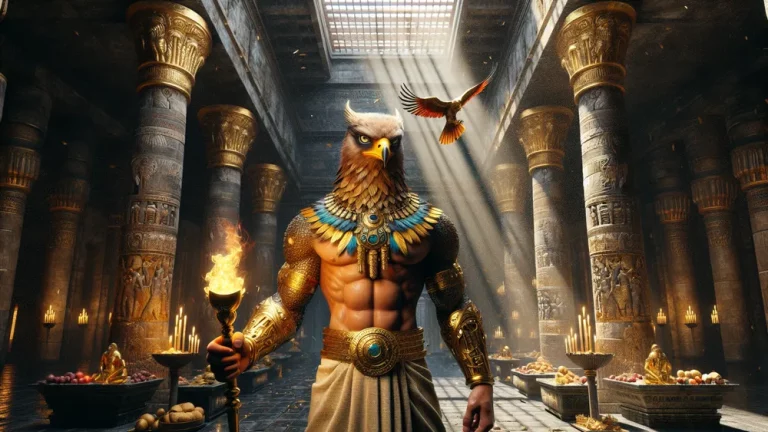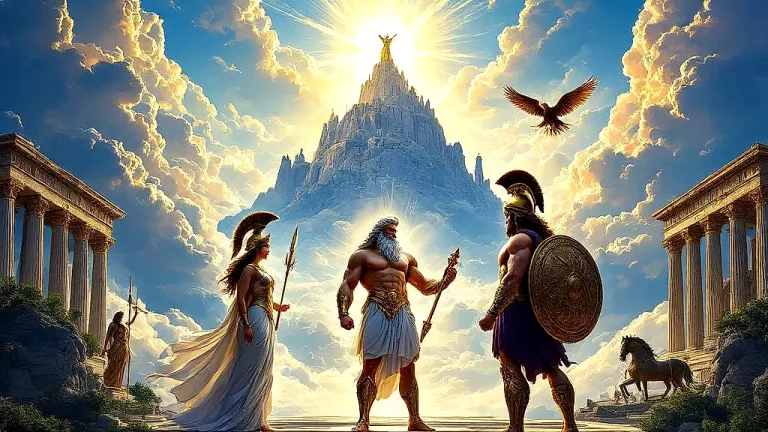Greek Mythology Briareus: The Hundred-Handed Giant Of Ancient Myths
Picture a giant so terrifying that even the gods were afraid of him. This was Briareus, one of the three Hundred-Handed Giants from Greek myths. His parents were Uranus (Sky) and Gaia (Earth), two of the oldest deities. Along with his brothers, he was one of the key players in the wars that decided who ruled the gods.
Key Points:
- Briareus was a giant with 100 hands and 50 heads, born from Uranus (Sky) and Gaia (Earth).
- He and his brothers were locked in Tartarus by Uranus but freed by Zeus to help fight the Titans.
- During the Titanomachy, Briareus threw huge rocks at the Titans, which helped Zeus win the war.
- Later, he guarded the Titans in Tartarus and once saved Zeus when other gods rebelled.
- In Homer’s Iliad, he’s called Aegaeon and appears as a sea god tied to Poseidon.
- Unlike the Cyclopes, who made Zeus’ weapons, Briareus was a fighter and prison guard.
- Though strong, he wasn’t as powerful as Typhon, who challenged Zeus directly.
With 100 arms and 50 heads, he had overwhelming strength. He could throw entire mountains as if they were small rocks. Even though Zeus and the other Olympians became more famous later, Briareus was still crucial in the war against the Titans.
He helped Zeus defeat them, and later, he even saved Zeus from a rebellion, as Homer wrote in the Iliad (where he’s called Aegaeon). But was he just a mindless monster, or did he actually have a role in divine politics? His story is a mix of raw power and strategic importance.
Keep reading to see how this ancient giant was both a weapon and a protector in the myths that shaped the Greek world.
Greek Mythology Briareus: Overview and Key Facts
| Category | Details |
|---|---|
| Name(s) | Briareus (most common), Aegaeon (in Homer’s Iliad). Note: Some stories treat these as different beings. |
| Title | One of the three Hundred-Handed Giants. |
| Parentage | Born from the ancient gods Uranus (Sky) and Gaia (Earth). |
| Siblings | – His two brothers, Cottus and Gyges, also Hundred-Handed Giants.<br>- The Cyclopes, like Brontes and Steropes.<br>- The Titans, including Cronus and Oceanus. Later myths sometimes mix these groups up. |
| Appearance | – Had 100 arms and 50 heads (Theogony).<br>- Looked like a huge, monstrous figure, almost like a moving fortress. |
| Powers | – Could throw 100 boulders at once.<br>- His strength was unmatched – even the Titans couldn’t compare. |
| Key Roles | – Fought with Zeus in the Titanomachy and buried the Titans under rocks.<br>- After the war, he also guarded the Titans in Tartarus (Theogony).<br>- He saved Zeus when Hera rebelled (Iliad). |
| Symbolism | He stood for raw, wild power, but he still supported Zeus to keep the world in order. |
| Cultural Impact | People didn’t worship him much, but they sometimes called on him in oaths (Iliad). Later poets (like Virgil) connected him to violent sea storms as “Aegaeon.” |
Where Briareus Came From
If we want to understand Briareus’ power, we should look at his origins. This means starting with how he was born and learning about his terrifying family.
His Birth and Primordial Family
Briareus was born to Uranus (the Sky) and Gaia (the Earth), who were the earliest gods in Greek mythology. These primordial deities represented the sky and land that formed the world. Uranus feared his children because of their strange appearances and great power, especially Briareus and his siblings.
Briareus belonged to three important groups:
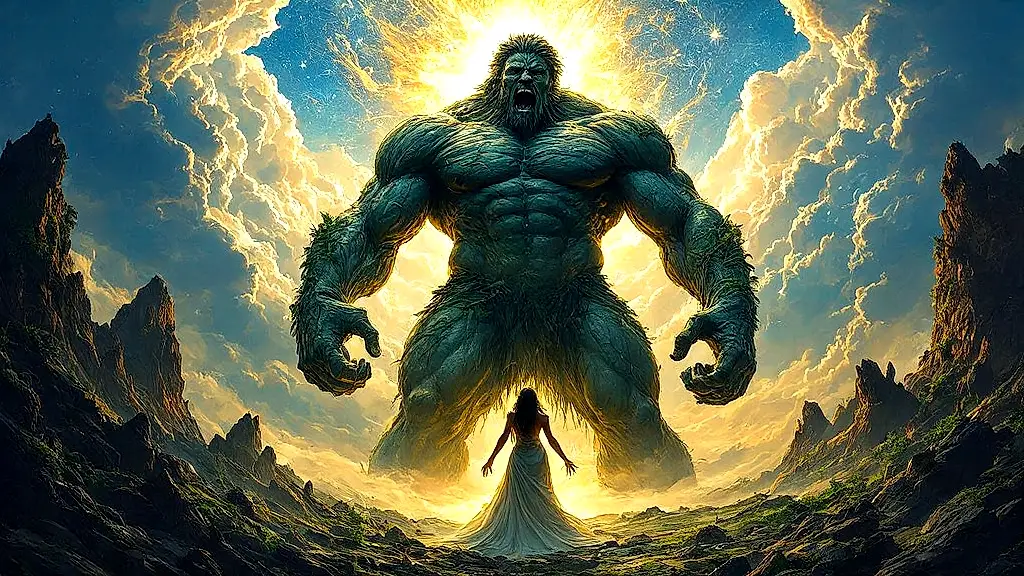
- The Hecatoncheires: His brothers Cottus and Gyges, who each had a hundred hands and fifty heads
- The Cyclopes: Giants with single eyes, including Brontes and Steropes, who would later make Zeus’ lightning bolts
- The Titans: This group included Cronus, who eventually overthrew Uranus, and Oceanus, the god of the great river
Because Uranus saw them as dangerous, he imprisoned all of them in Tartarus. This decision would lead to major conflicts among the gods later on.
Briareus, a hundred-handed giant born from the sky and earth, was locked away by his father Uranus out of fear, sparking future godly wars.
The Hecatoncheires: What Their Names Mean
The name “Hecatoncheires” translates to “Hundred-Handed Ones” in Greek. While these giants shared this group name, Briareus had other names that show different versions of his story. In Homer’s Iliad, he appears as Aegaeon, which may link him to the Aegean Sea or suggest a connection to goats (from the Greek word aix).
These naming variations tell us how Greek traditions viewed these beings differently:
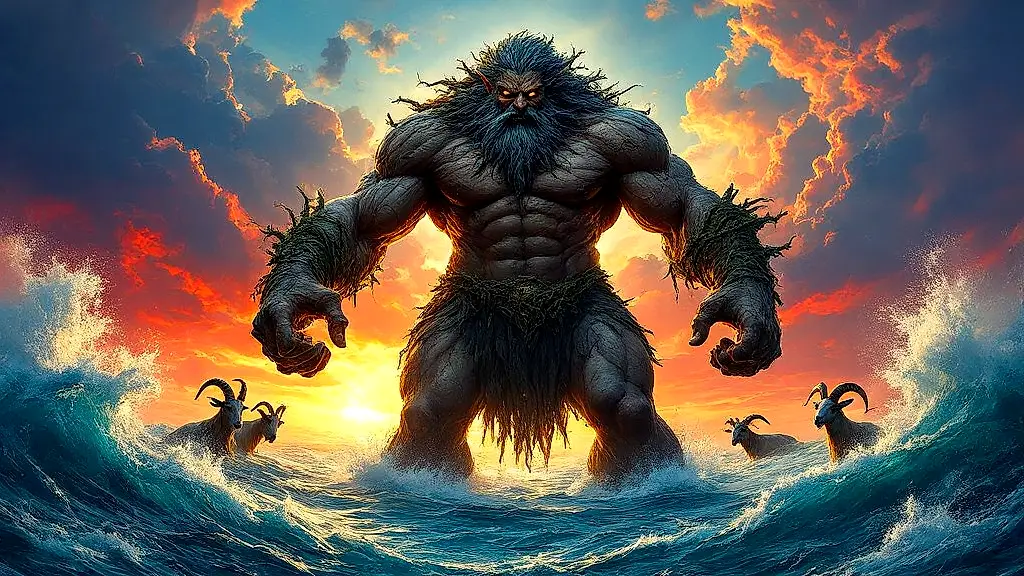
- Briareus: Likely comes from a Greek word meaning “strong” or “powerful”
- Aegaeon: Homer’s version that connects him to the sea and storms
- Obriareus: A rare form that might emphasize his great strength
- Hecatoncheires: The group name that refers to their hundred hands
Note: Some experts argue whether Aegaeon and Briareus were originally different characters that became combined over time.
Briareus’ Family and Ties
Now that we’ve covered Briareus’ origins and names, let’s examine his important connections among the gods. This includes both his close family members and the Titans he later fought against.
His Divine Relatives
Briareus was born to Uranus (Sky) and Gaia (Earth), who were among the first divine beings. Unlike most major gods, Briareus had no children in the myths we know, which makes his siblings especially important for understanding his role.
| Relation | Names | Significance |
|---|---|---|
| Parents | Uranus (Sky) and Gaia (Earth) | The first gods who created the world |
| Siblings (Hecatoncheires) | Cottus, Gyges | Other hundred-handed giants who were imprisoned in Tartarus |
| Siblings (Cyclopes) | Brontes, Steropes, Arges | One-eyed giants who made Zeus’ lightning bolts |
| Offspring | None in main stories | Unlike many gods, didn’t have divine descendants |
Briareus and the Titans
Uranus feared his powerful hundred-handed sons and imprisoned Briareus and his brothers in Tartarus, the underworld’s deepest part. The Titans, who were Briareus’ older siblings, later overthrew Uranus but kept the Hecatoncheires locked away. This decision would help Zeus later. When the Olympians fought against the Titans, Zeus freed Briareus and his brothers. The hundred-handed giants became powerful allies in the war.
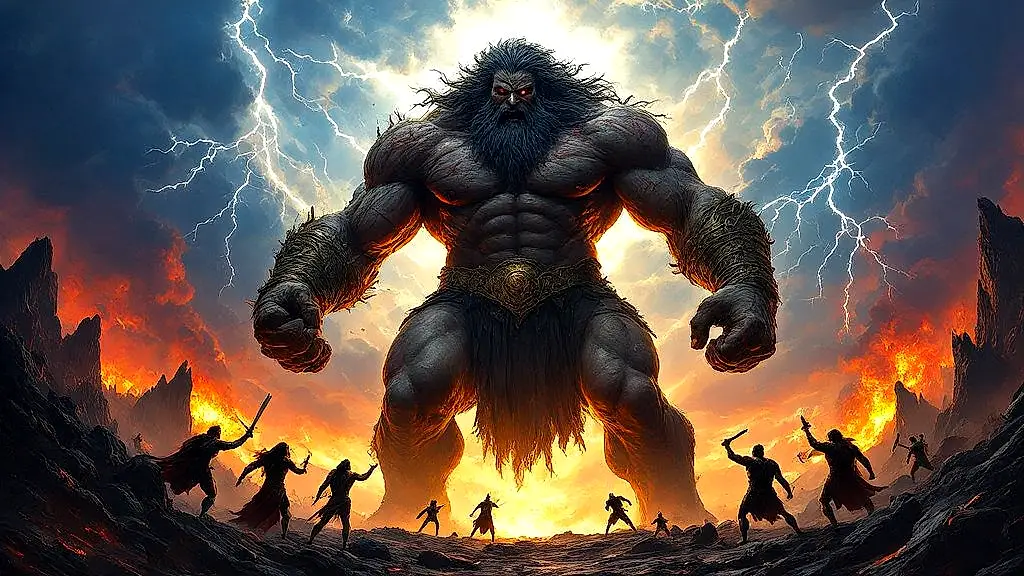
According to Hesiod, Briareus used all hundred hands at once to throw huge stones at multiple Titans. Their help was crucial in the Titanomachy, the war that made Zeus ruler of the gods. It was significant because the Hecatoncheires were actually brothers to the Titans they fought against.
Briareus’ Traits and Meaning
Now that we’ve seen Briareus in the divine conflicts, let’s look at what gave him his power. We’ll examine both his unique physical traits and the meaning the Greeks gave him in their view of the world.
What He Looked Like and His Powers
Briareus had terrifying physical features that made him incredibly powerful. Ancient texts describe him with:
- 100 powerful hands: Each could hurl boulders as large as houses, making him effectively an entire army by himself
- 50 heads: Positioned around his body, giving him the ability to see in every direction at once
- Immense strength: He once protected Zeus from rebellion by restraining other gods single-handedly
- Earth-shaking throws: His boulder attacks could alter landscapes, as recorded in Titanomachy stories
These features had specific meanings in Greek mythology. The hundred hands showed complete physical dominance, while the fifty heads represented total awareness. When Hesiod wrote about Briareus, he was describing the physical form of unstoppable power. Briareus could cause earthquakes with multiple hands at once and spot enemies from great distances with his many heads. This made him the perfect weapon in the massive battles between gods and Titans.
Briareus, the Keeper of Tartarus
After the Titanomachy, Briareus took on one of the most important roles in the Greek cosmos. He became the guardian of Tartarus, where the defeated Titans were imprisoned. His hundred hands could restrain multiple Titans at once, while his fifty heads constantly watched over the dark prison. Because normal chains couldn’t hold gods, Briareus himself became the physical restraint that maintained cosmic order.
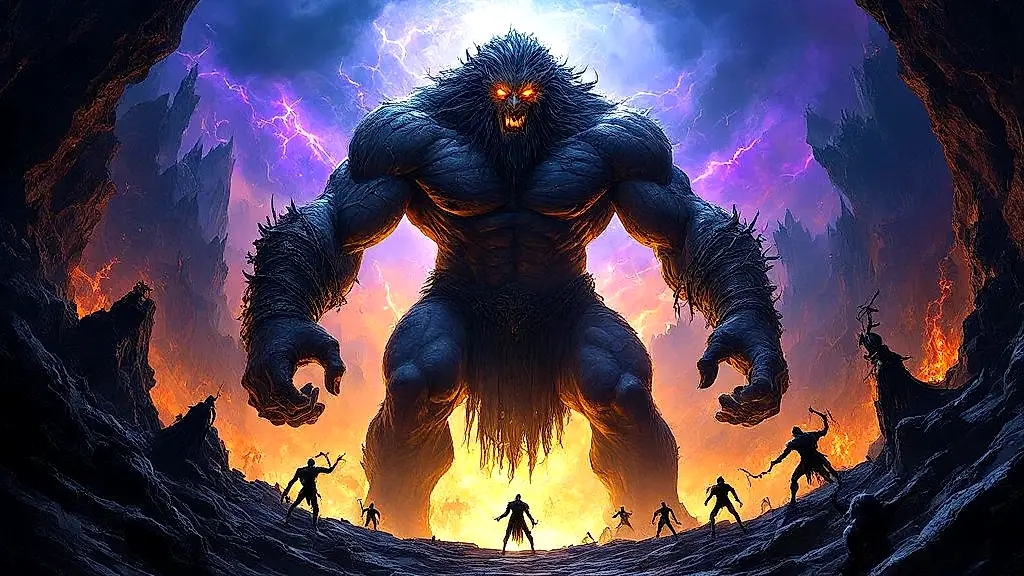
This change from battle weapon to permanent guardian demonstrated Zeus’ strategy for keeping peace after the war. Briareus’ unique abilities made him perfectly suited to contain the powerful Titans in their prison.
Briareus used his hundred hands and fifty heads to keep the Titans locked up in Tartarus, making sure they couldn’t escape and cause more trouble.
How Briareus Fought in the Titanomachy
Zeus used Briareus as his most powerful weapon during the rebellion against the Titans. With his unique physical abilities, Briareus played a crucial role in the Titanomachy, the great war between gods and Titans. Here’s how his powers helped Zeus win this divine conflict.
The Battle Against the Titans
When Zeus planned to overthrow Cronus and the Titans, he freed Briareus and his brothers from Tartarus. This decision helped Zeus win the war. According to Hesiod’s Theogony, only the Hecatoncheires had enough power to defeat the Titans. Zeus offered them freedom if they would fight for him. During the battle, the Hecatoncheires used overwhelming force.
Each of their hundred arms could throw boulders as large as mountains with perfect aim. They created constant attacks that the Titans couldn’t stop. The Theogony describes how their throws filled the sky with stones, completely covering the Titan forces. The Titans couldn’t fight against enemies who could grab many weapons at once and block attacks from all sides.
Ancient texts say the Hecatoncheires scared the Titans just by being there. After their victory, Zeus put them in charge of guarding the defeated Titans in Tartarus – the same prison they had escaped from. This victory established the Olympian rule we know from Greek myths.
Why Zeus Owed Briareus
Zeus owed Briareus because he helped him win the Titanomachy. Without Briareus’ strength against the Titans, Zeus might have ended up imprisoned like his father Cronus. This created a sacred debt that even Zeus couldn’t ignore, which forced him to remain grateful to Briareus.
The debt became most important during the rebellion described in Homer’s Iliad. When Hera, Poseidon and Athena tried to overthrow Zeus, Briareus (called Aegaeon in this story) did three crucial things:
- Freed Zeus when the other gods had chained him
- Scared the rebelling gods into surrendering
- Made sure no one could challenge Zeus again
Later, when Briareus helped Zeus a second time, it showed he wasn’t just a powerful fighter. He became a powerful and loyal ally who could decide who ruled Olympus, but only used this power when Zeus needed help.
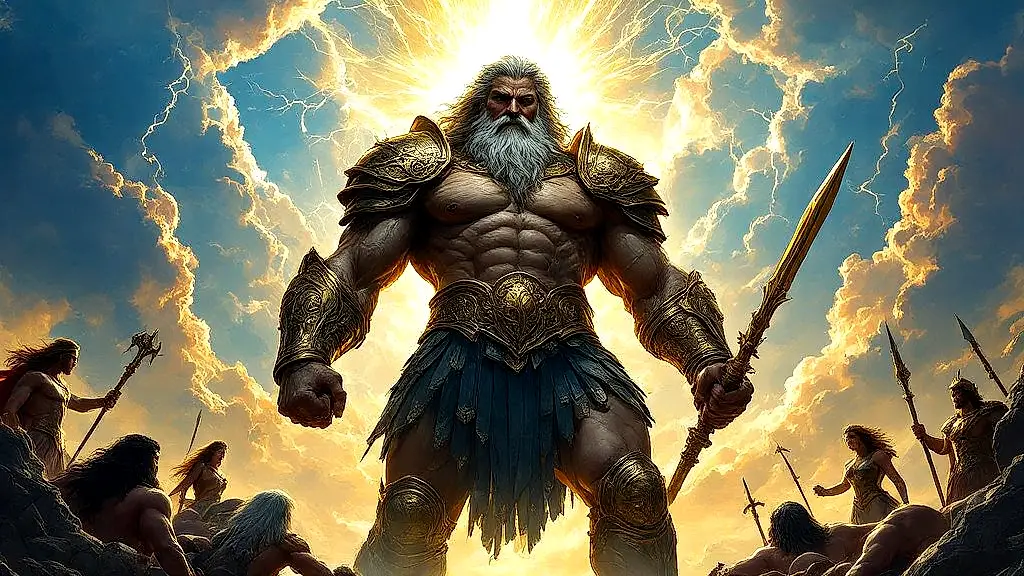
Lesser-Known Stories About Briareus
Besides his well-known actions in divine conflicts, Briareus appears in several lesser-known stories. These tales show different sides of him that most people don’t know about. While he’s famous for his battles, there are also other myths that tell different versions of the hundred-handed giant’s story.
Briareus as Aegaeon: The Giant of the Sea
Homer’s Iliad shows a different version of Briareus, calling him Aegaeon and describing him as a sea god who worked with Poseidon. This sea version differs from Hesiod’s story where Briareus guarded Tartarus, which means people may have worshipped him differently in coastal areas. In mainland Greece, people saw him as the hundred-handed prison keeper.
But among sea-faring Ionians, he became Aegaeon, a powerful sea god who could control waves with his many hands. Some experts think Homer changed the story for his audience, similar to how stories get adapted today. The name Aegaeon comes from “aigis” meaning sea-storm, which suggests he controlled rough waters. As Aegaeon, he wasn’t just Zeus’ helper but also Poseidon’s important ally.
This shows how Greek myths could change depending on where and who told them, making Briareus one of the most interesting examples of how these stories evolved.
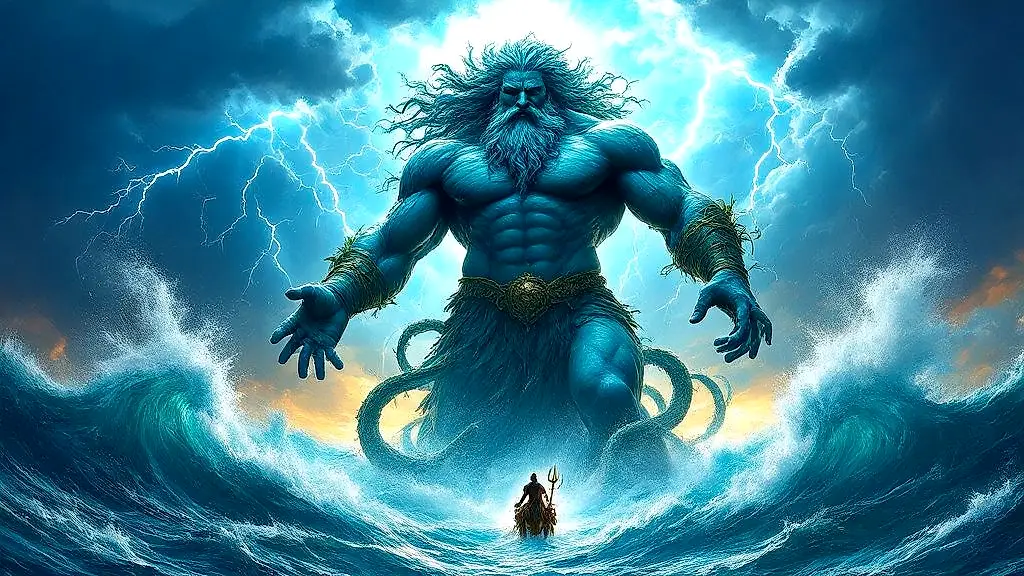
His Fight with Orion
In a rare story preserved by Pherecydes of Athens, Briareus fought against the famous hunter Orion because they both wanted a nymph. This was different from Briareus’ usual fights with gods, showing him in a more personal conflict. Both could throw mountains, and their hundred hands against Orion’s great strength made the fight equal until gods had to stop it.
This version shows Briareus in an unusual situation where he acted more like mortal heroes. The fact that we only have parts of this story suggests it might come from a local tradition that imagined these powerful beings having human-like rivalries. Even creatures as strong as Briareus and Orion could be driven by the same emotions that affected regular people.
Briareus and Orion clashed over a nymph, revealing how even mighty beings could be driven by human-like emotions and rivalries.
Briareus Compared to Other Giants
Now that we’ve seen Briareus’ unique stories, let’s compare him to other powerful giants in Greek mythology. This shows us important differences in their strength, what they did, and how people remembered them in myths.
How He Differs from the Cyclopes
Briareus and his brothers might look similar to the Cyclopes at first – both were children of Uranus and Gaia – but they had very different jobs in Greek myths. The Cyclopes were skilled metalworkers who made Zeus’ thunderbolts with their single large eyes, while Briareus and his brothers worked as guards who used their hundred hands to keep Titans locked in Tartarus.
This table shows their main differences:
| Attribute | Briareus (Hecatoncheires) | Cyclopes |
|---|---|---|
| Physical Traits | 100 hands, 50 heads | Single large central eye |
| Abilities | Massive strength, rock-throwing | Divine blacksmithing |
| Divine Role | Tartarus guards | Weapon-makers for gods |
| Mythological Significance | Titanomachy warriors | Forged Zeus’ thunderbolts |
Greek myths gave these powerful beings specific roles. While the Cyclopes created weapons for the gods, Briareus and his brothers physically kept the Titans imprisoned. This shows how even the strongest creatures had clearly defined jobs in mythology.
Briareus vs. Typhon: Who Was Stronger?
In terms of raw power, Typhon – the fire-breathing monster with snake-like legs – was probably stronger. He could challenge Zeus himself and made the gods afraid, while Briareus used his hundred hands to throw boulders. Typhon’s voice shook mountains and he could spit molten rock, showing he had incredible power that went beyond normal giants. Ancient stories say most gods ran from Typhon, but Briareus, though extremely strong, always served the Olympian gods.
Their relationship with Zeus shows the key difference: Briareus was Zeus’ most trusted helper (he even saved Zeus during a rebellion in the Iliad), while Typhon was the biggest threat to Zeus’ rule. Briareus supported divine order, but Typhon tried to destroy it.
The myths tell us Zeus didn’t need help against Briareus, who stayed loyal, but had to use all his thunderbolts and tricks to finally defeat Typhon.
FAQs
1. Why did Zeus free Briareus from Tartarus?
Zeus freed Briareus from Tartarus because he needed his immense strength to defeat the Titans in the Titanomachy.
2. Was Briareus stronger than Zeus?
While Briareus possessed immense strength, Zeus was ultimately stronger as the supreme ruler of the gods.
3. What happened to Briareus after the Titanomachy?
After the Titanomachy, Briareus guarded the Titans in Tartarus and occasionally intervened in divine conflicts, such as rescuing Zeus from rebellion.
4. How is Briareus different from his siblings?
Briareus is different from his siblings as the only Hecatoncheir invoked in later myths, notably mediating disputes among the gods in Homer’s Iliad.

